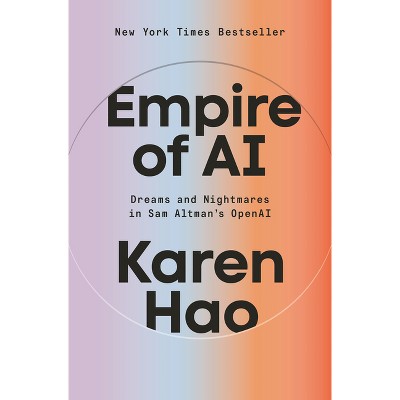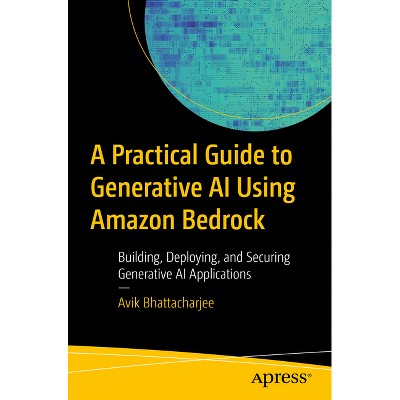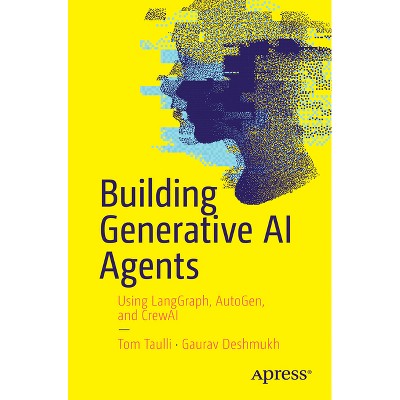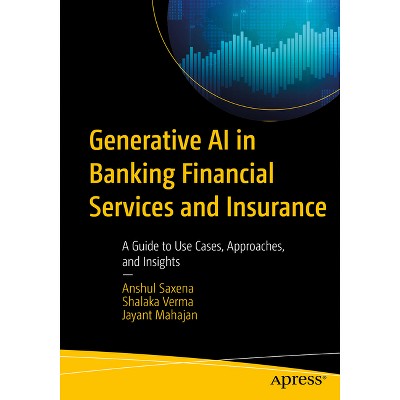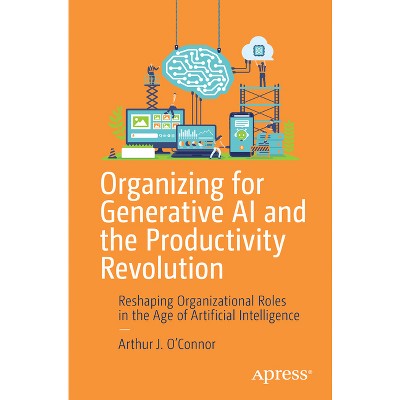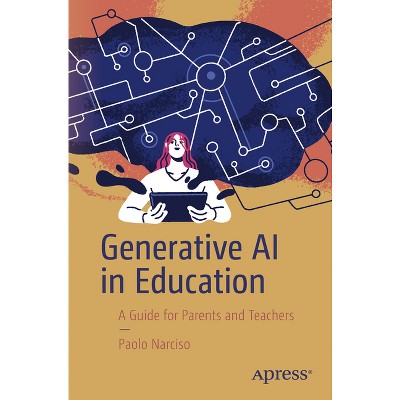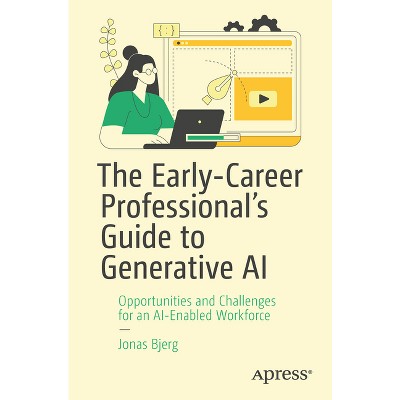Optimizing Generative AI Workloads for Sustainability - by Ishneet Kaur Dua & Parth Girish Patel (Paperback)

About this item
Highlights
- This comprehensive guide provides practical strategies for optimizing Generative AI systems to be more sustainable and responsible.
- About the Author: Ishneet Kaur Dua is an experienced solutions architect specializing in generative artificial intelligence, machine learning, environmental sustainability, and cloud computing.
- 335 Pages
- Computers + Internet, Intelligence (AI) & Semantics
Description
Book Synopsis
This comprehensive guide provides practical strategies for optimizing Generative AI systems to be more sustainable and responsible. As advances in Generative AI such as large language models accelerate, optimizing these resource-intensive workloads for efficiency and alignment with human values grows increasingly urgent.
The book starts with the concept of Generative AI and its wide-ranging applications, while also delving into the environmental impact of AI workloads and the growing importance of adopting sustainable AI practices. It then delves into the fundamentals of efficient AI workload management, providing insights into understanding AI workload characteristics, measuring performance, and identifying bottlenecks and inefficiencies. Hardware optimization strategies are explored in detail, covering the selection of energy-efficient hardware, leveraging specialized AI accelerators, and optimizing hardware utilization and scheduling for sustainable operations. You are also guided through software optimization techniques tailored for Generative AI, including efficient model architecture, compression, and quantization methods, and optimization of software libraries and frameworks. Data management and preprocessing strategies are also addressed, emphasizing efficient data storage, cleaning, preprocessing, and augmentation techniques to enhance sustainability throughout the data life cycle. The book further explores model training and inference optimization, cloud and edge computing strategies for Generative AI, energy-efficient deployment and scaling techniques, and sustainable AI life cycle management practices, and concludes with real-world case studies and best practices
By the end of this book, you will take away a toolkit of impactful steps you can implement to minimize the environmental harms and ethical risks of Generative AI. For organizations deploying any type of generative model at scale, this essential guide provides a blueprint for developing responsible AI systems that benefit society.
What You Will Learn
- Understand how Generative AI can be more energy-efficient through improvements such as model compression, efficient architecture, hardware optimization, and carbon footprint tracking
- Know the techniques to minimize data usage, including evaluation, filtering, synthesis, few-shot learning, and monitoring data demands over time
- Understand spanning efficiency, data minimization, and alignment for comprehensive responsibility
- Know the methods for detecting, understanding, and mitigating algorithmic biases, ensuring diversity in data collection, and monitoring model fairness
Who This book Is For
Professionals seeking to adopt responsible and sustainable practices in their Generative AI work; leaders and practitioners who need actionable strategies and recommendations that can be implemented directly in real-world systems and organizational workflows; ML engineers and data scientists building and deploying Generative AI systems in industry settings; and researchers developing new generative AI techniques, such as at technology companies or universities
From the Back Cover
This comprehensive guide provides practical strategies for optimizing Generative AI systems to be more sustainable and responsible. As advances in Generative AI such as large language models accelerate, optimizing these resource-intensive workloads for efficiency and alignment with human values grows increasingly urgent.
The book starts with the concept of Generative AI and its wide-ranging applications, while also delving into the environmental impact of AI workloads and the growing importance of adopting sustainable AI practices. It then delves into the fundamentals of efficient AI workload management, providing insights into understanding AI workload characteristics, measuring performance, and identifying bottlenecks and inefficiencies. Hardware optimization strategies are explored in detail, covering the selection of energy-efficient hardware, leveraging specialized AI accelerators, and optimizing hardware utilization and scheduling for sustainable operations. You are also guided through software optimization techniques tailored for Generative AI, including efficient model architecture, compression, and quantization methods, and optimization of software libraries and frameworks. Data management and preprocessing strategies are also addressed, emphasizing efficient data storage, cleaning, preprocessing, and augmentation techniques to enhance sustainability throughout the data life cycle. The book further explores model training and inference optimization, cloud and edge computing strategies for Generative AI, energy-efficient deployment and scaling techniques, and sustainable AI life cycle management practices, and concludes with real-world case studies and best practices
By the end of this book, you will take away a toolkit of impactful steps you can implement to minimize the environmental harms and ethical risks of Generative AI. For organizations deploying any type of generative model at scale, this essential guide provides a blueprint for developing responsible AI systems that benefit society.
What You Will Learn
- Understand how Generative AI can be more energy-efficient through improvements such as model compression, efficient architecture, hardware optimization, and carbon footprint tracking
- Know the techniques to minimize data usage, including evaluation, filtering, synthesis, few-shot learning, and monitoring data demands over time
- Understand spanning efficiency, data minimization, and alignment for comprehensive responsibility
- Know the methods for detecting, understanding, and mitigating algorithmic biases, ensuring diversity in data collection, and monitoring model fairness
Review Quotes
"This very good scientific book meets several key criteria for being intellectually valuable and accessible to the reader. It has a clearly defined topic and objective that is understandable from the start, that is, the reader knows what to expect. Moreover, a logical structure guides the reader through the content coherently and comprehensibly. ... it is worth reading this interesting book." (Jerzy Balicki, Computing Reviews, April 28, 2025)
About the Author
Ishneet Kaur Dua is an experienced solutions architect specializing in generative artificial intelligence, machine learning, environmental sustainability, and cloud computing. With years of hands-on experience, she excels in designing resource efficient, cost-effective, resilient systems on leading cloud platforms such as AWS, GCP, and Azure. Ishneet started her career at CDK Global where she worked as a DevOps engineer and focused on building highly available Kubernetes environments on AWS cloud and on-prem. Passionate about leveraging AI and ML for innovation, Ishneet has expertise in diverse areas, including low code no code ML, computer vision, NLP, recommendation engines, and predictive analytics. She advocates for ethical AI practices, ensuring fairness and transparency in AI systems while making them accessible through open-source initiatives.
As a thought leader, Ishneet shares her insights at global tech conferences, focusing on AI/ML, cloud architecture, and sustainability. She actively mentors women in tech, aiming to inspire and empower the next generation of STEM professionals. Driven by a vision of harnessing technology for positive change, Ishneet is dedicated to building a future where AI creates opportunities for all and addresses complex real-world challenges.
Parth Girish Patel is a seasoned architect with a wealth of experience spanning over 17 years, encompassing management consulting and cloud computing. Currently, at Amazon Web Services (AWS), he specializes in artificial intelligence/machine learning, generative AI, sustainability, application modernization, and cloud-native patterns to deliver resilient, high-performance solutions optimized for cost and operational efficiency.
Starting his career as a software engineer, Parth transitioned into consulting at Deloitte, where he provided strategic guidance to Fortune companies on their cloud implementation and led intricate enterprise transformations. This diverse background equipped him with a unique blend of business acumen and technical expertise, enabling him to navigate complex digital transformations effectively. As an AWS solutions architect, Parth plays a pivotal role in guiding customers through their cloud journey and AI adoption, offering insights into scalable architectures and implementing end-to-end machine learning solutions. With specialization across leading cloud providers like AWS, Azure, and GCP, as well as proficiency in Machine Learning skills like Natural Language Processing, Computer Vision, and predictive analytics, Parth is well-equipped to tackle diverse technical challenges.
Passionate about sustainable AI, Parth advocates for the responsible and ethical use of AI, emphasizing transparency and environmental consciousness. He leverages his leadership skills to mentor teams and individuals, fostering a collaborative and innovative environment aimed at driving a positive impact across organizations and society as a whole.


